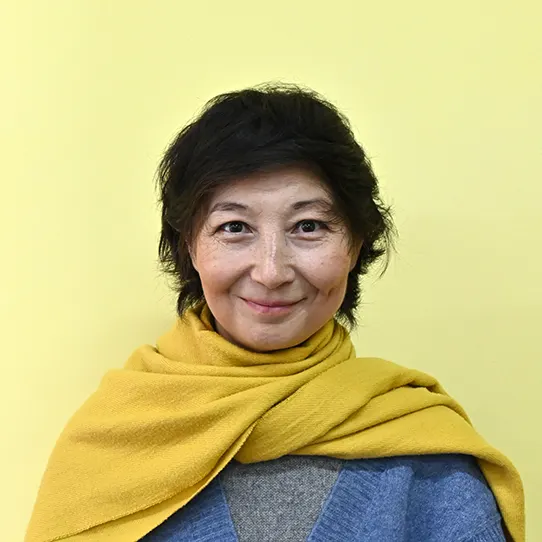Angels of Freedom is light. It is education and enlightenment. It is country’s future. It is a part of each of us.
— Aelita, what are you doing in the project?
— You may say that I make “angels”. Further, I participate in fairs where we collect donations for restoration of schools and since recently, for the restoration of kindergartens.
— Have you been involved in the project since its launch?
— Frankly, I don’t even know when it started. But I got involved since June last year. When the war started, we started to bring the first humanitarian aid to the Ukrainian embassy in Astana. And since then, I have been going there as a volunteer helping to pack things, collect humanitarian aid, load. There were many of us, and we were all different. We didn’t even get to know each other, and if we did, we would often forget the names. Because there was no time for this — to get acquainted and communicate, everything was going on automatically. Moreover, it was winter, it was cold, there was the war. This was so awful! And you know, everyone was shocked.
— How did you get involved in the Angels of Freedom project?
— I found out about him through the Humanitarian Aid Headquarters. The volunteers with whom we worked together told me that there is such a project. They went, and I went with them. And the first thing they told us was the purpose of the project. It turned out that our coordinators are Ukrainians. For example, Iryna is from the city of Chernihiv schools and kindergartens of which we help now. She explained and showed us everything and, naturally (well, it’s a natural aspiration for a person), we began to help.
When I look at married couples from Ukraine who come to us, I think: “It’s ten or hundred times harder for them than for us.” It doesn’t cost me anything to help. And what about them?
— Do your family members support you?
— There is no agreement among my relatives regarding help and support. Some of them, for example, my cousin, happened to just admire the Russian president. The Russian television is very widespread here. TV now plays a dominant role, and propaganda works indeed. I can say for myself. I have not shared it with anyone for a long time (smiles)… but I also used to watch the Russian TV channels. Indeed, just seven years ago, even I, a person with two higher educations, tended to think: “Wow, the Russian politicians are doing well.” And now… what great insights can happen!
— And when did your attitude change?
— After the war was started, something seemed to turn over in me. One could not have dreamed it even in a nightmare. And I came to this project because it pursues a good course: it supports education, enlightenment. This is what makes a person mentally grow. Our young guys and girls are very tolerant and receptive to this idea. And, strangely enough, more compassionate. With them this message that we collect donations for schools resonates very quickly. This is my observation. When I talk to young people, I tell them: “Kazakh children often do not like to go to school, and the Ukrainian children just have not been physically able to go to school for more than a year.” And they start thinking. It takes longer time to explain the purpose of our fund raising to more adult generation 45+. They begin to ask: “Will this money really reach the purpose?”, “Where and what for will they be spent?”
— What do you want to convey to people when you talk to them at fairs?
— Because we are very far from hostilities, and the war lasts for more than a year, people’s sensitivity fades. They detach themselves from the war. And I have this picture right before my eyes: how the bombs hit a house… You know, for example, I live and work in Astana to buy an apartment with a mortgage. Back in February, after loading another humanitarian aid, we were returning home one late evening. It was cold, windy, snowy. And I remember walking and thinking: “I have a place to go back to. Even if it is only a rented apartment, but there is a roof, water, light and heat. And they have nowhere to go.” Just imagine people who saved up for a mortgage for 10 years, finally bought this mortgage apartment, and just like me, they bought these curtains, this table, chair, lamp at IKEA, furnished the apartment, they still have to repay it for 10 years, but it’s already destroyed. This is awful! And every time I visualize it for myself. Not to terrify myself, but to know that the goal is to help. You are sitting here now, well fed, shod, dressed, in a bright office; you have the Internet, you have a computer, a phone with a charger, a toilet, hot water, after all. And they have nothing. At the moment, this is what makes me act. There, a thousand kilometers away, children want to go to school. This is the main point. We must do our job and must not get tired. Because people there need our help now. You go to tolokas because your help is needed. You go to the mosque and pray for these people, because the Almighty will hear your prayer.
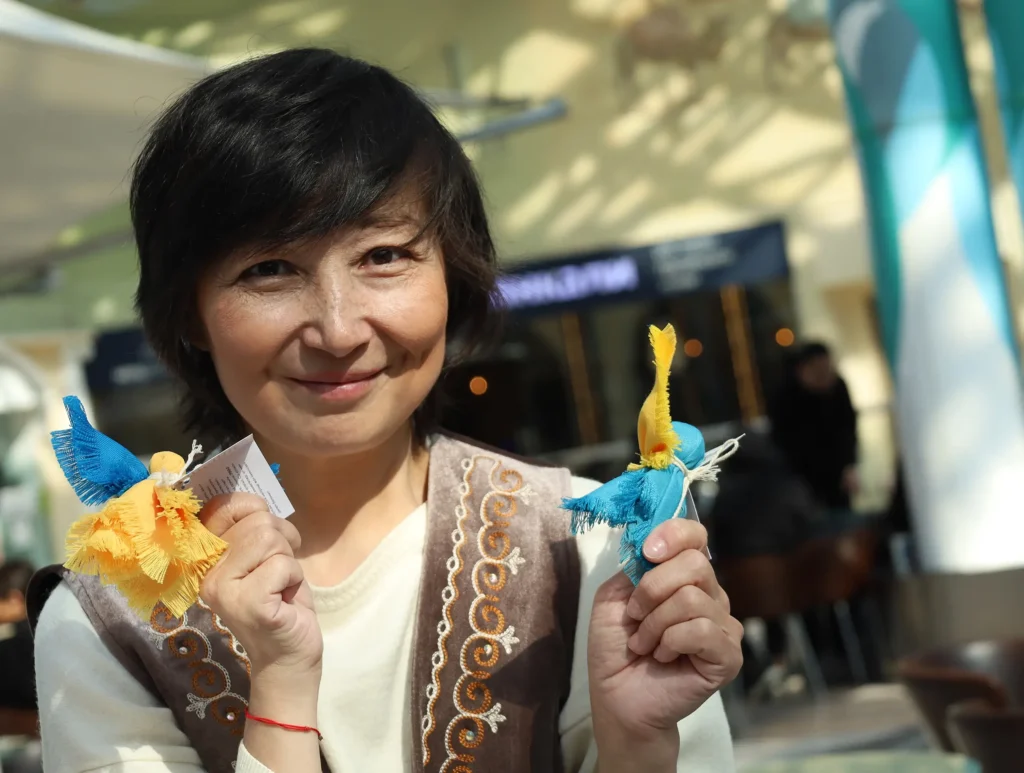
— Probably, volunteering can also be called a kind of prayer.
— Yes, and there is one more thing. There are a lot of rich people in Kazakhstan, businessmen who build yurts of invincibility in Ukraine. While we, the common people, do not have such financial and physical resources, to send a million dollars, for example. But each of us does what he or she can. The same prayer also makes good.
— A million people who direct their good intentions to help Ukraine are no less important (and perhaps even more) than one person’s million dollars.
— Yes, sure.
— Does participation in aid projects change the people who come there?
— Our volunteers are discovering some new talents. For example, I was just so delighted and shocked to see a 45-year-old woman who had never held in her hands neither plaster, nor anything like that, she was imbued with the idea of help and began to make various household crafts from plaster — plates, vases. And the person began to succeed! In general, because of the war, people in Kazakhstan began to distinguish Russian cities by region, they began to know more about the history of Russia and Ukraine. And by the way, I discovered that people in Russia know absolutely nothing about our writers, poets, artists. While our children are taught about Russian artists and writers in schools, I mean, in Kazakh schools with the Kazakh language of instruction. Our children speak both Russian and Kazakh well. And I was faced with the fact that young people who arrived in Kazakhstan from Russia do not know a lot about our country. And the most surprising thing for me was that many of them were in Thailand a hundred times, but never came to Almaty or Astana. Even though we are neighbours. It turns out that because of the war, the Russians are discovering the “new” world of the CIS. They discover that Kazakhstanis have musicians, artists, sights, and unique nature.
— What do you remember most about your volunteer life in the Angels of Freedom project? May be, certain people or events?
— One person has felt into my memory the most. Her name is Natalya. She has now left for Poland. She is an ethnic Ukrainian, but for many years she lived in the Urals and worked at universities. She said: “Ukraine is my ethnic homeland, and Russia is the country in which I have lived most of my life.” When she arrived here, she also joined our team. And thanks to her, I realized that in this project get to know other people, their stories, we can see how they have not lost their humanity, despite all the circumstances. When I look at married couples from Ukraine who come to us, I think: “It’s ten or hundred times harder for them than for us.” It doesn’t cost me anything to help. And what about them? Not only are they a thousand kilometres from their home, in a foreign country, among strangers, but they are also constantly worrying about their loved ones who stayed there. They get some news from them every day, sometimes good, sometimes not so good. And yet they have the courage to come and do something. This is what amazes me about people.
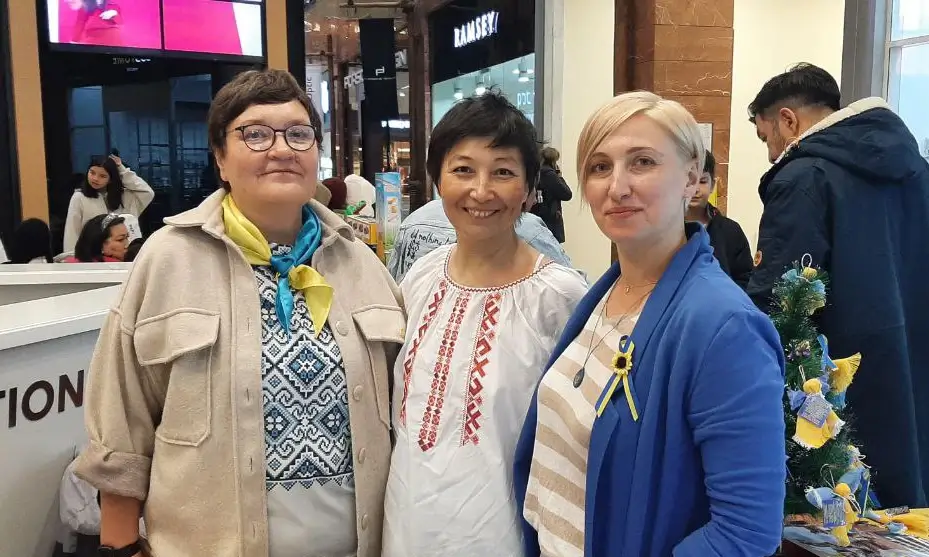
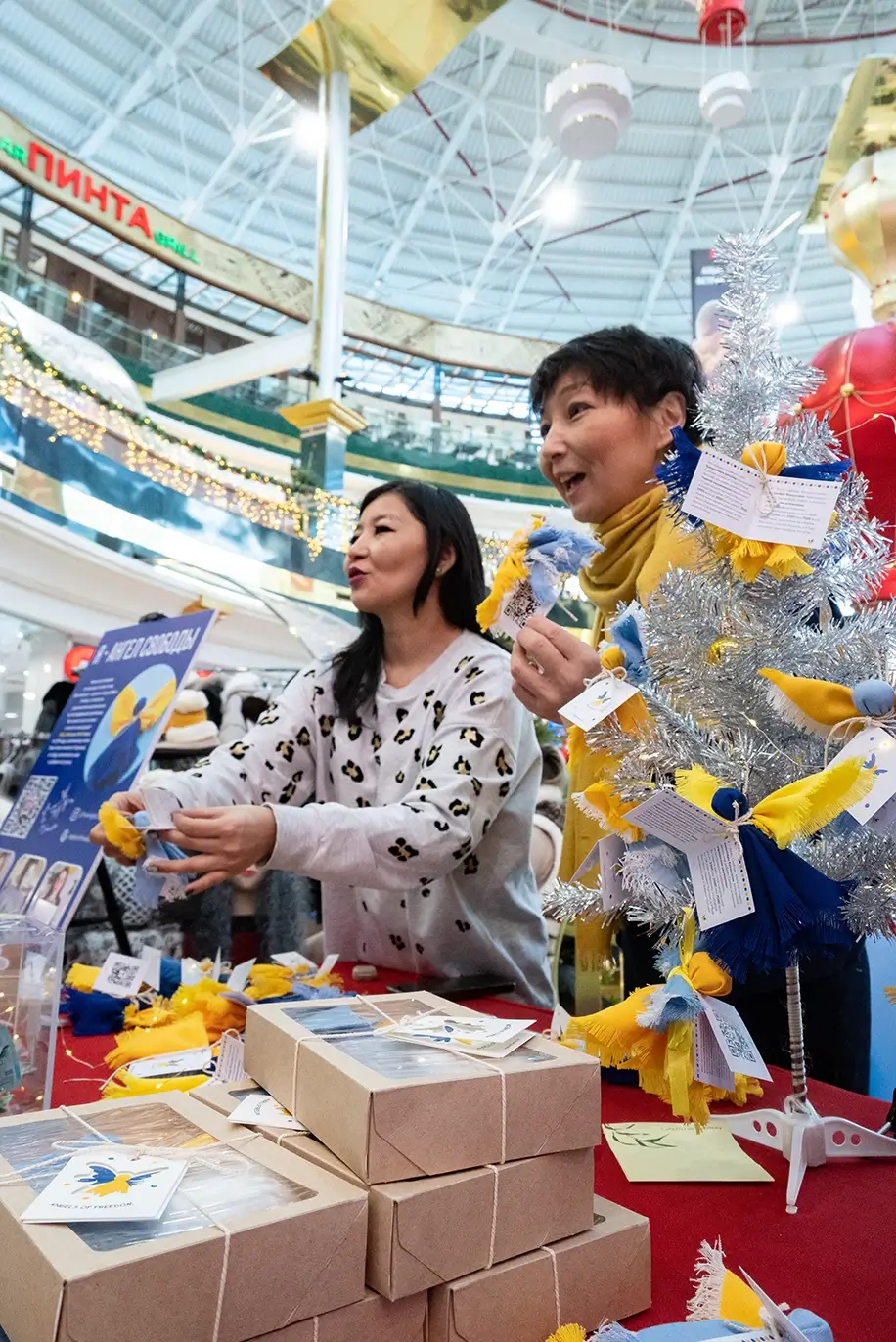

— It turns out that the Angels of Freedom help people of different nationalities to better understand each other?
— Indeed. As a citizen of Kazakhstan, I am also extremely grateful to the foreign volunteers for treating my country, my city, and my nation with respect. They don’t say: “Oh, we don’t like it here, we’re don’t like it there.” In our country, as in any post-Soviet country, we have our pros and cons. Sometimes, the cons are many. But their inner culture does not allow them to criticize the Kazakhs. Notwithstanding that they are here, these people’s hearts are still there. I admire them. Take even Iryna, our coordinator: she has so much resilience, so much courage. During all this time, since the launch of the project, they have gone through a lot, overcame many organizational difficulties. In addition, we are volunteers, not employees. When we do not perform quite well, our coordinators are so delicate and well-mannered that they never reproach us with anything. They have a lot of tact. They understand that people invest their time (which is also an invaluable resource), emotions or money. Even if they comment on anything, they avoid offending anyone. This is also important.
— Aelita, and what was the most joyful moment during your time with the project?
— The most joyful moment was when we earned a million tenge in three days! Our entire team worked at two fairs in parallel. It was such an achievement! Another joyful one was when we were sent a video from Chernihiv that they have bought equipment for the school with the money we have collected. All these things were unloaded from the truck and laid out at the entrance of the school. And you know, at that moment I wanted to cry. And many of us cried. Because it was a huge work, and we have striving to this for a long time.
— And the saddest one?
— And the saddest one… probably, the time when the war was started. And this feeling does not go away because the war is not over. And you live with this thought all the time. Further, as a volunteer who participates in fairs, I get very upset when I see in people not only indifference, but also weariness from the war. Even though, we do not take any part in hostilities. Hearts are hardening, that is, people have begun to get used to a state of things when a war is going on out there. And here you are standing at the fair, some young man comes up and says: “Aaaah, Ukraine! Yes, I know. Hasn’t it ended there — the war?” And it feels so bad.
Just imagine people who saved up for a mortgage for 10 years, finally bought this mortgage apartment, and just like me, they bought these curtains, this table, chair, lamp at IKEA, furnished the apartment, they still have to repay it for 10 years, but it’s already destroyed. This is awful!
— Where do you source energy to continue volunteering, and do you feel the burnout?
— No, there is no burnout. Because you know that you need to go and do the job. I don’t have to dig the ground or work at a mine. The project itself gives the strength… it makes it easier for me. It’s easier to endure grief when we are together. There is such a Kazakh proverb: “koppen korgen uly toy” [being together with everyone is a great joy, sometimes translated as “two in distress makes sorrow less” — editor’s note]. If you are in the community, then any difficulty or adversity is perceived as a great holiday, because we are together.
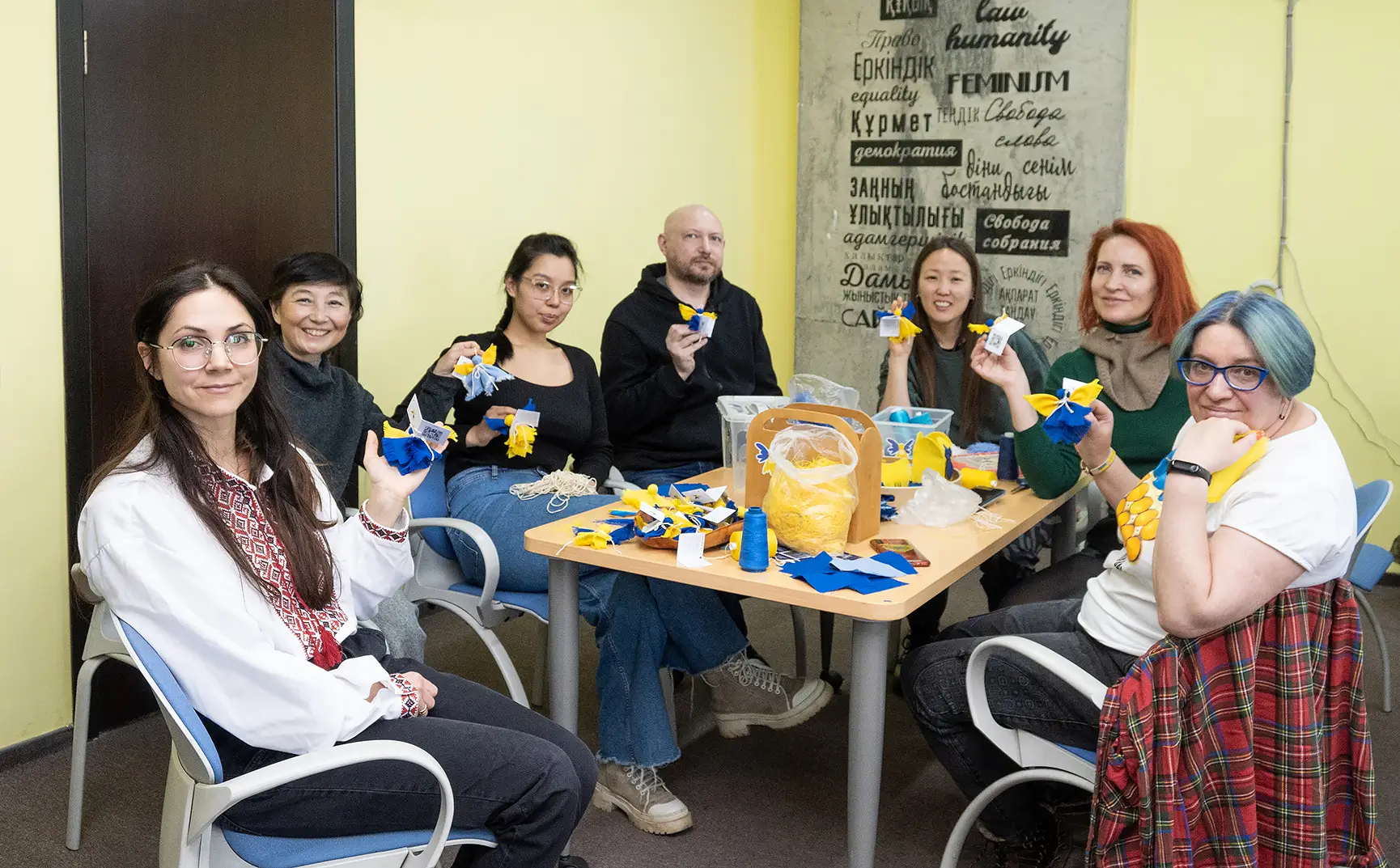
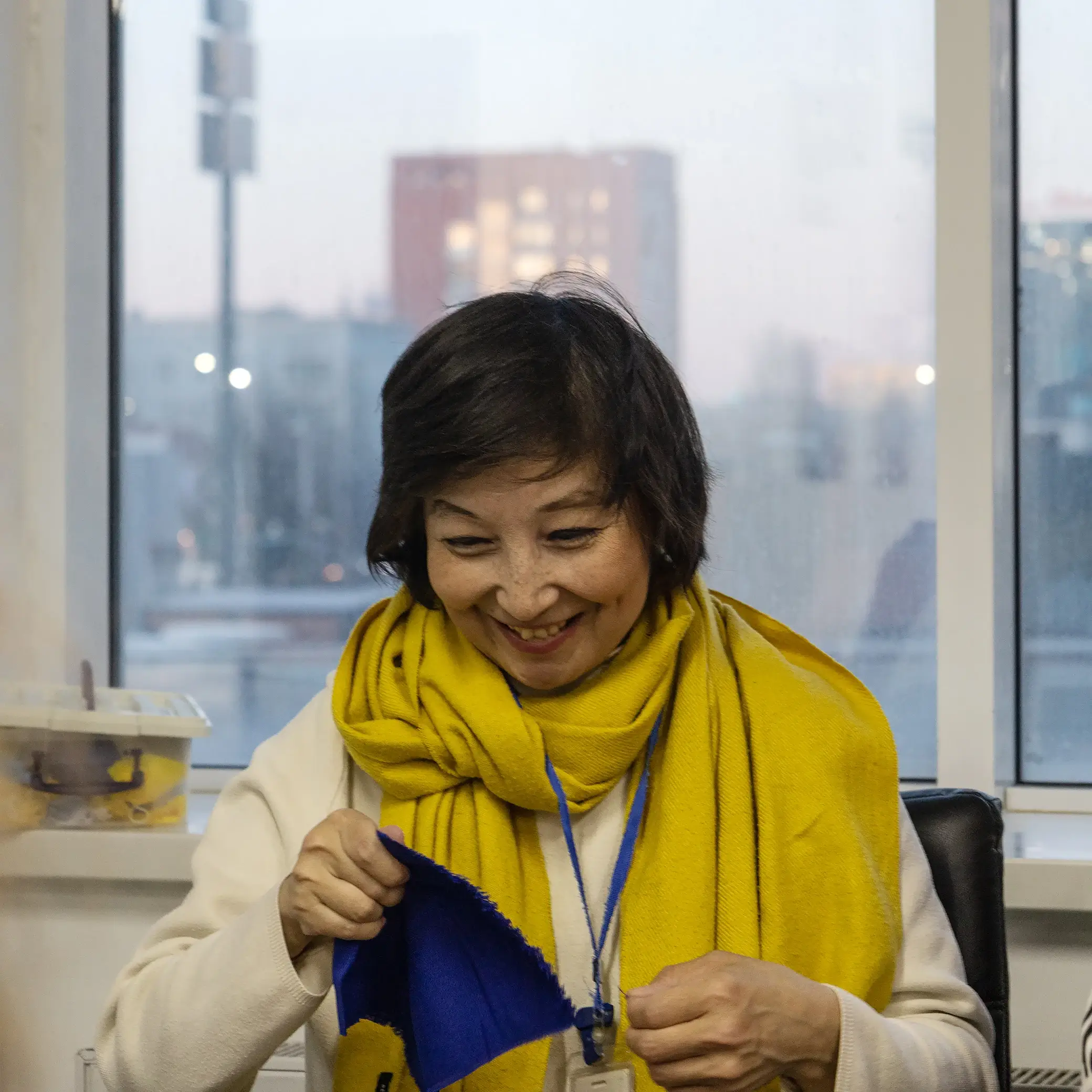
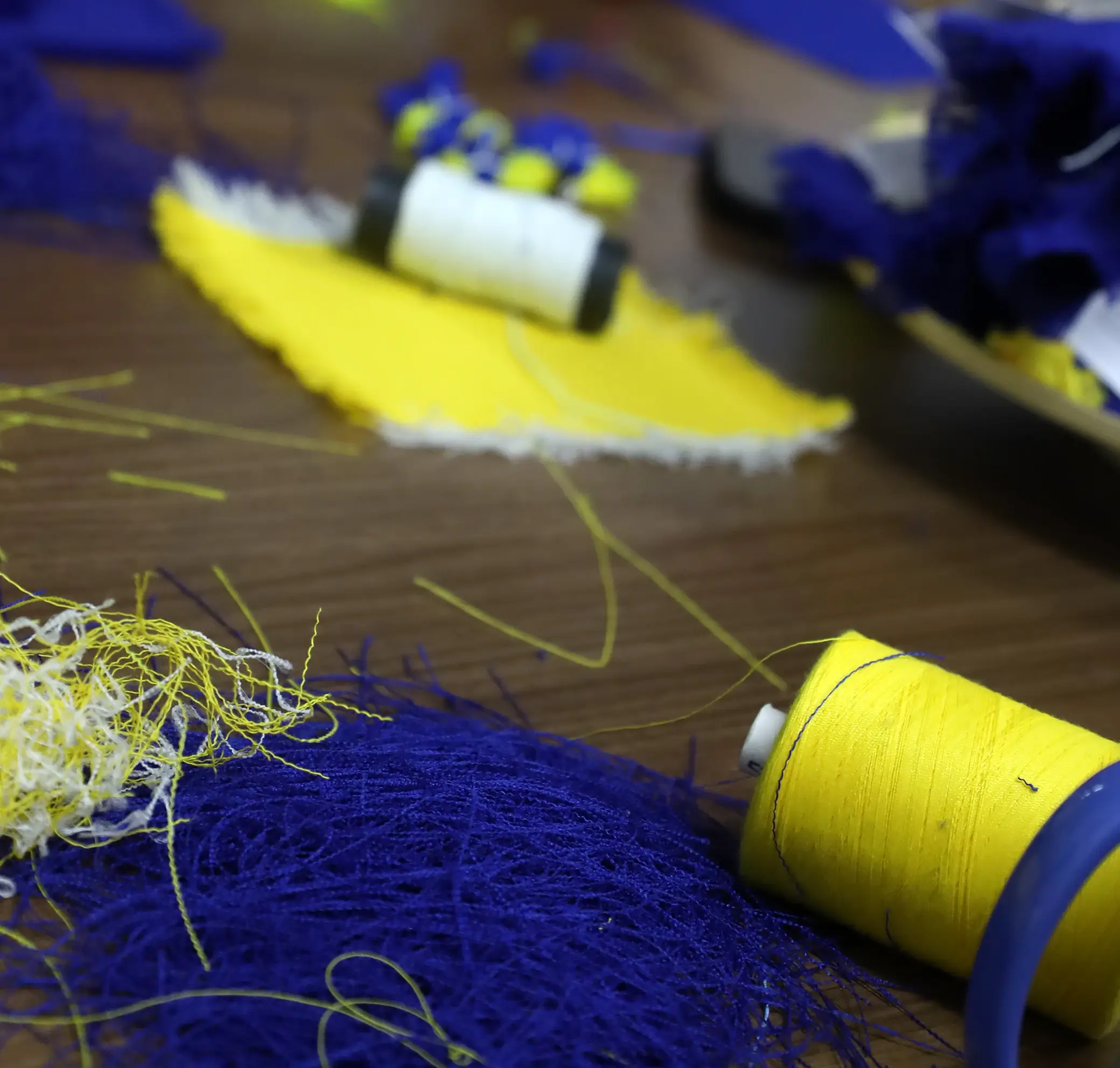
— Have you changed while participating in the Angels of Freedom project? And, if yes, how have you changed?
— I have learned to keep low profile. There is support for Ukraine in our country. Everyone does what they can, but it is not widely publicized. Some of my fellow citizens take my participation in the project as if I have nothing else to do in my life, as just “fooling around”. They say: “Well, of course, you don’t have a husband, seven children, a mother-in-law, a father-in-law and a cat.” Therefore, I do not make my participation in the project public — neither at work, nor on the street, nor in the store, nor in the public transport. I’m like that tin soldier: walking around and doing my job. This is like my second job. And there is a purpose, you know? If the first job is aimed at earning money for an apartment. Here my goal is to build a bomb shelter so that another school and another kindergarten have it. When there is a goal, life is a little easier.
And we also need to remember that we carry goodness. Among us there are many good, kind, bright people. Because we are united by a good and bright idea. As my acquaintance says, this project does not gather bad people.
— Aelita, tell us please what events are taking place in the project? What’s new has happened lately?
— Well, first of all, we moved to a new office in Astana. Secondly, we had run a hackathon, a competition among young people to create an IT application for our project. This hackathon was attended by young people from all over Kazakhstan, talented IT specialists. Further, we began to hold tolokas for kids. There was a toloka at the US Embassy, in which the ambassador himself took part. We also presented the Angels of Freedom project at the Human Rights Hub office in Astana. Each such an event is like a new stage of development. We also got a TikTok account recently. Our volunteers conduct charity workshops and lectures. Natalya, whom I mentioned above and who left for Poland, gave lectures about Ukraine, the Ukrainian language, culture and traditions. We even had cinema nights where Ukrainian movies were demonstrated. It all unifies and develops.
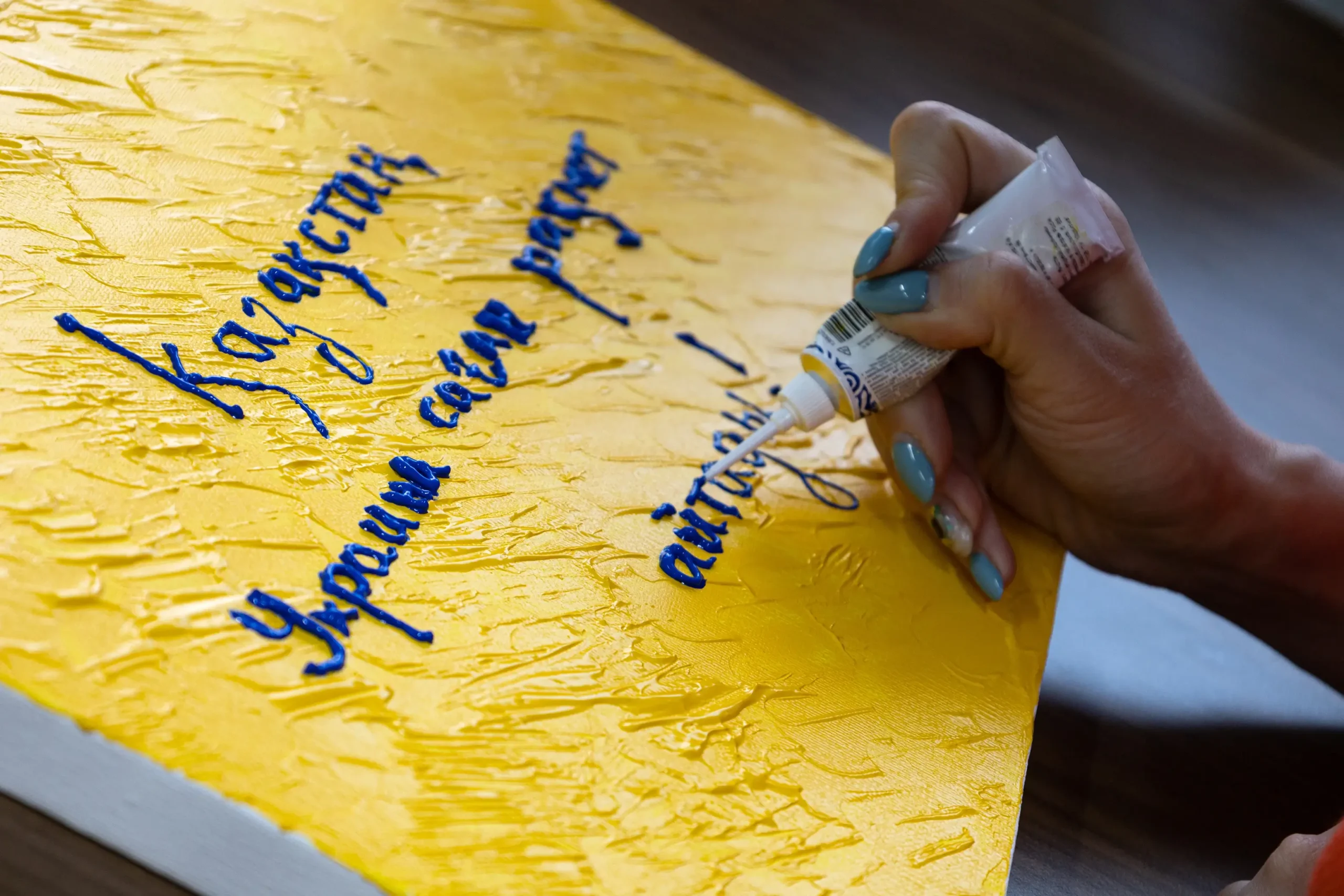
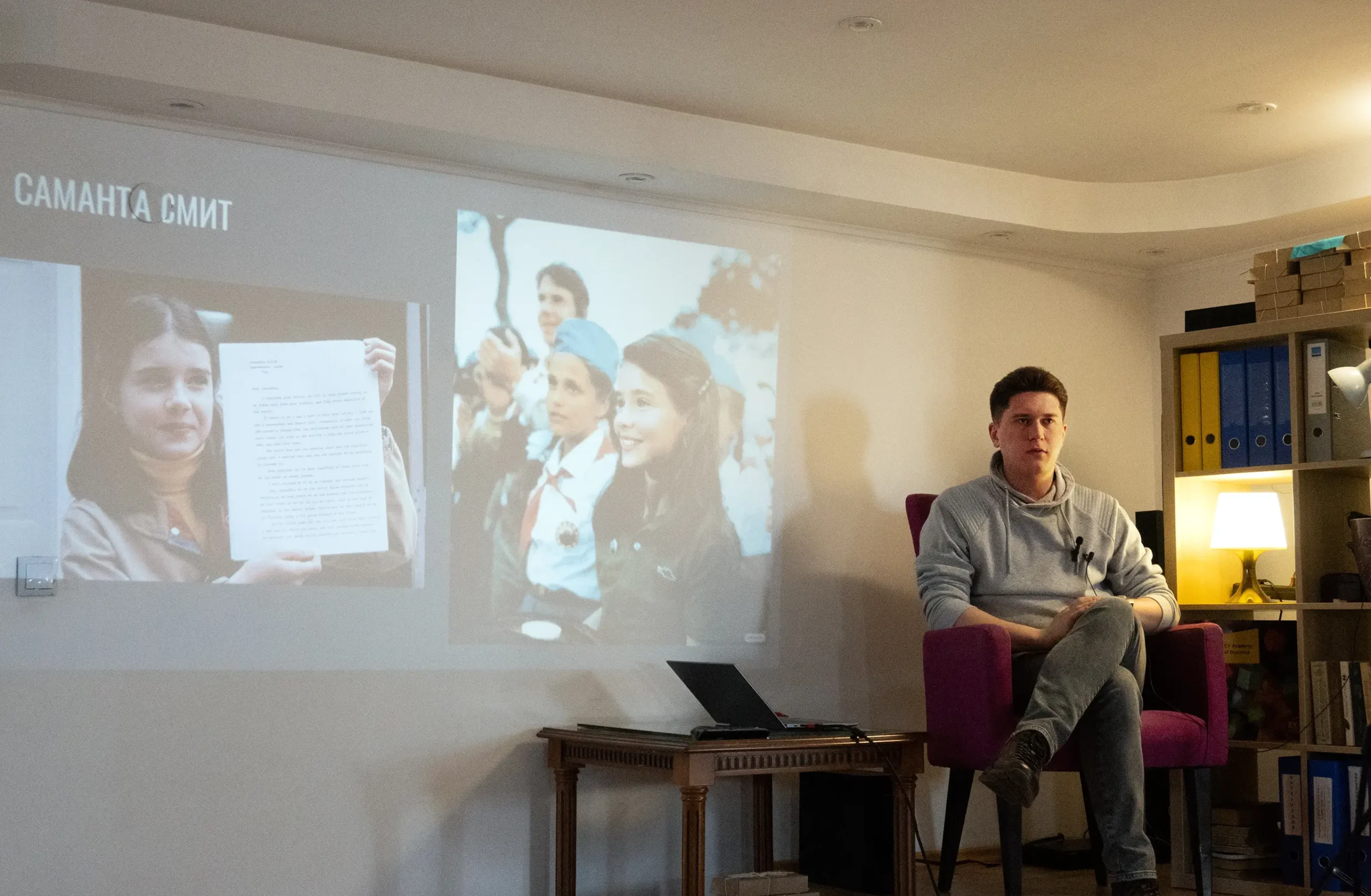
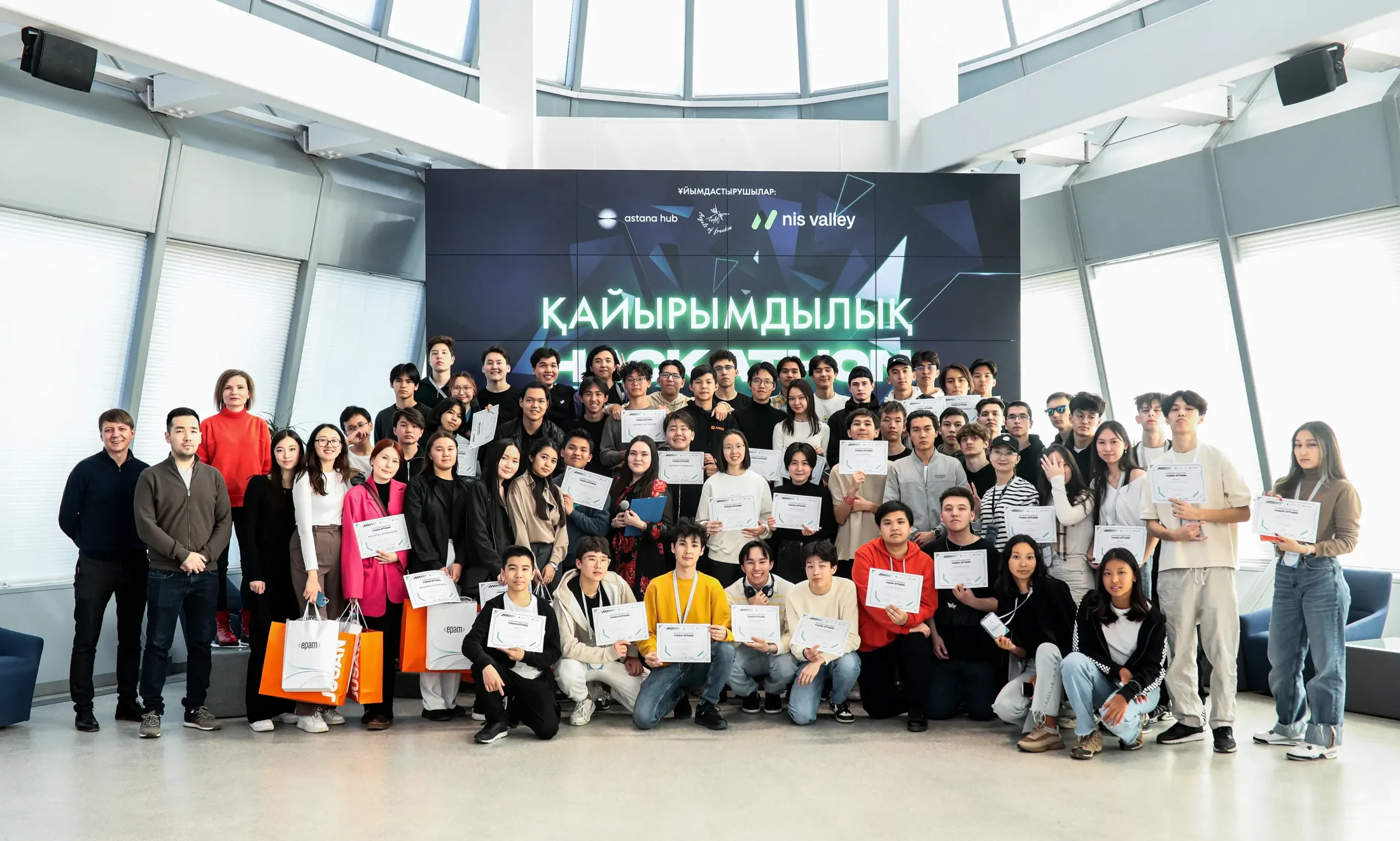
— What advice do you have for newcomers who take part in fairs for the first time? Do you say any instructions?
— The main advice is to always remember that we are contributing to a common cause, and this is a great cause, to remember that we have a purpose, and not to be afraid. But, of course, they will still be afraid because volunteers are all different. In the sense that among us there are Kazakhs, and Russians, and Ukrainians. And some of them are shy, because they have never had to communicate so much with people from other countries. And we also need to remember that we are doing good. There are a lot of good, kind, bright people among us. Because we are united by a kind and bright idea. As one friend of mine says, this project does not gather bad people. A bad person will not join, it will not even occur to him to come here.
— Aelita, how would you continue the phrase “The Angels of Freedom project is…”?
— It is light. It is education and enlightenment. It is country’s future. It is a part of each of us.
